| | 
CLICK HERE: "RECENT EVENTS"
*****************************
In the past year the CCRJ has been active in numerous countries around the world, assisting democratic reform and propagating the development of ethical media as part of the orgainisation's strategy for conflict resolution. Click here for descriptions of CCRJ activities in: Cameroon; Sarawak; Saudi Arabia; Lebanon; Azerbaijan; Palestine; Aghanistan

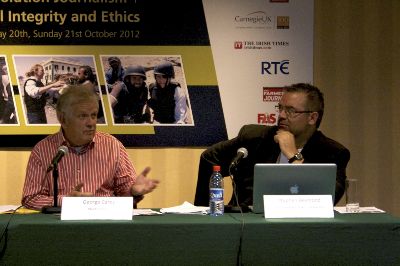 PICTURE: October 21st, 2012: Steve Desmond interviews the
Founder of BBC's Newsnight George Carey and filmmaker and chairs a conference panel entitled "Documentary Films that Make a Difference" at the international 2012 Conference "Upholding Professional Integrity in Journalism & Documentary Filmmaking". PICTURE: October 21st, 2012: Steve Desmond interviews the
Founder of BBC's Newsnight George Carey and filmmaker and chairs a conference panel entitled "Documentary Films that Make a Difference" at the international 2012 Conference "Upholding Professional Integrity in Journalism & Documentary Filmmaking".
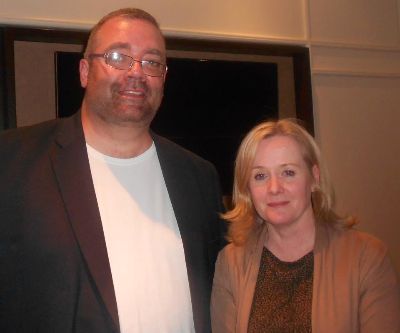 March 22nd, 2012--The Broadcasting Authority of Ireland and The
Cleraun Media Forum screen Steve Desmond's recent film (on political
corruption in the Middle East) in Dublin. Desmond is pictured here on the night
with Roisin Duffey of RTE who introduced the film screening and chaired
the presentation & screening. March 22nd, 2012--The Broadcasting Authority of Ireland and The
Cleraun Media Forum screen Steve Desmond's recent film (on political
corruption in the Middle East) in Dublin. Desmond is pictured here on the night
with Roisin Duffey of RTE who introduced the film screening and chaired
the presentation & screening.
October 14th, 2011: Steve Desmond (CCRJ Co-Founder) has been included in 'Strathmore's Who's Who' for his contribution to media and communications.
October 2011--Dr. Ronan Lynch (historian, journalist and CCRJ Director of Research) is interviewed on National Public Radio in the US about the history and politics of music.
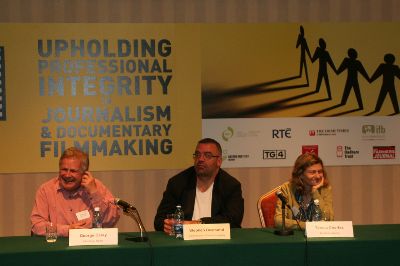 October 16th, 2010: Steve Desmond interviews the Founder of BBC's Newsnight George Carey and chairs a conference panel entitled "Ethics in Documentary Filmmaking" at the international Conference "Upholding Professional Integrity in Journalism & Documentary Filmmaking". October 16th, 2010: Steve Desmond interviews the Founder of BBC's Newsnight George Carey and chairs a conference panel entitled "Ethics in Documentary Filmmaking" at the international Conference "Upholding Professional Integrity in Journalism & Documentary Filmmaking".
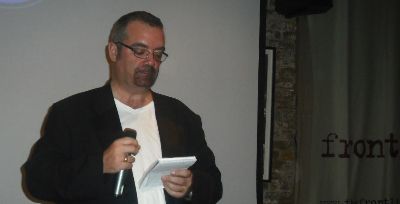 On November 23rd 2009- On November 23rd 2009-
The world-famous Frontline Club for war journalists in London screened Stephen Desmond's documentary, 'The
Jaweed Al Ghussein Story'.
Stephen is pictured here answering questions from fellow journalists after the screening.
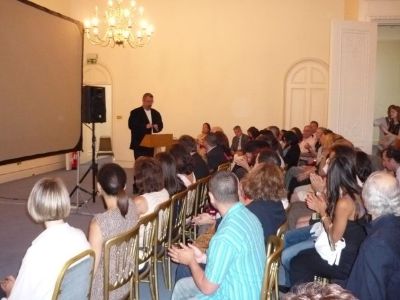 July 2009-- Steve Desmond addresses The Foreign Press Association. July 2009-- Steve Desmond addresses The Foreign Press Association.
SEE FOREIGN PRESS ASSOCIATION WEBSITE:
http://www.foreign-press.org.uk/showevent.pl?id=381
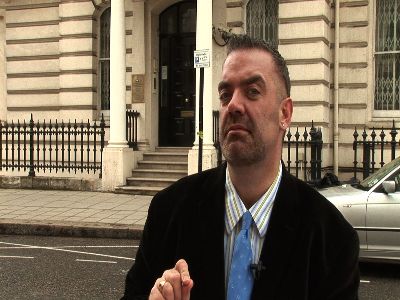 On July 2nd, 2009- On July 2nd, 2009-
Stephen Desmond's documentary, 'The Jaweed Al Ghussein Story', was pre-screened byThe Foreign Press Association (FPA) in London on July 2nd at 7pm to an audience of journalists and dignitaries from around the world. The screening took place in the elegant Foreign Press Association Head Office on Carlton House Terrace close to Buckingham Palace. The FPA, William Morris, Canon Andrew White and Crown Prince Shwebomin of Burma introduced the film. Desmond said: "I am truly delighted by this honour and I am truly delighted that this film is screening at The Foreign Press Association during the one-year anniversary of Al Ghussein's death around July 2nd, 2009." The film tells the story of how Palestinian patriot and political moderate Jaweed Al Ghussein (Chairman of The Palestinian National Fund) was falsely accused by Yasser Arafat of embezzling $6 million from The Palestinian National Fund, abducted, held under house arrest in Gaza and subjected to a systematic smear campaign. The film focuses on providing a narrative history of Al-Ghussein's abduction, positioning the incident within a wider discussion of Human Rights abuse in the Middle East. Stephen was commissioned by The Times Higher Education Supplement to write an article on his film during the production process. Desmond's article Documenting Injustice appeared in the THES in October 2007. SEE FOREIGN PRESS ASSOCIATION WEBSITE: http://www.foreign-press.org.uk/showevent.pl?id=381
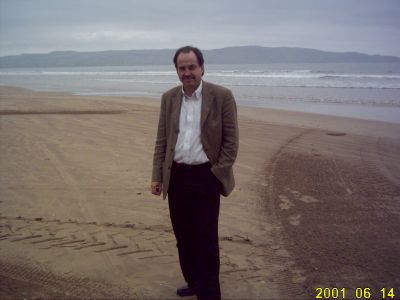 May 2009--CCRJ Co-founder Barry Lowe has been awarded
a grant from the government's Department for International Development
(DfID).
The grant of £10,000, a Develepment Education Fund
Mini Grant, will pay for a project to produce content on developing
world issues for UK's HE journalism curricula.
Barry said the main activity would be training a
group of exiled journalists - journalists from developing countries who
fled to the UK to escape persecution - in teaching skills.
These journalists would then be employed as guest
lecturers to deliver seminars on developing world issues to journalism
classes in UK universities.
Barry told MyArts: "I'm hoping
this small grant will lead to more successful bids for funding with
DfID. DfID is a significant international donor, distributing hundreds
of millions of pounds to support projects centred on developing world
issues." May 2009--CCRJ Co-founder Barry Lowe has been awarded
a grant from the government's Department for International Development
(DfID).
The grant of £10,000, a Develepment Education Fund
Mini Grant, will pay for a project to produce content on developing
world issues for UK's HE journalism curricula.
Barry said the main activity would be training a
group of exiled journalists - journalists from developing countries who
fled to the UK to escape persecution - in teaching skills.
These journalists would then be employed as guest
lecturers to deliver seminars on developing world issues to journalism
classes in UK universities.
Barry told MyArts: "I'm hoping
this small grant will lead to more successful bids for funding with
DfID. DfID is a significant international donor, distributing hundreds
of millions of pounds to support projects centred on developing world
issues."
******************************
REVIEW OF CCRJ CONFERENCE:
PEACE OR PATRIOTISM? JOURNALISTS AND CONFLICT
Wednesday-Friday, 11th-13th February 2004, Belfast
By Francis Pott
The London College of Music & Media’s grasp on the humanities sometimes leads its researchers to question not merely what is ‘human’?, but also what is ‘humane’? This was the focus of an impressive and timely conference event convened recently by CCRJ Executive Director Barry Lowe, (also of LCMM’s Media Studies Department). Drawing upon his own global experience in journalism, Barry conceived this event as a meeting point for men and women braving a notoriously arduous profession under many of the world’s most repressive régimes or in its most disturbed areas. The event embraced Indian and Pakistani conflict over Kashmir, dictatorship in Zimbabwe, violent crime and poverty in Jamaica, ethnic and territorial division in Cyprus, Guyana and Fiji, strife in Nigeria between Muslims and Christians, armed neutrality and recent civil war in Sierra Leone and Liberia, and the continuing troubles in Northern Ireland itself.
What to the external eye might seem a recipe for collective breast-beating and helplessness produced instead a deeply moving, harrowing but inspiring experience, in which one delegate after another spoke with modesty, restraint and an almost unnerving composure of experiences and atrocities frequently beyond the full comprehension of lesser mortals. All, however, radiated an undimmed commitment to pursuing the causes of truth, justice, equity and objective fairness in reporting, betraying the depth of their own sacrifices without personal bitterness or rancour. Some, such as Sani Musa from Abuja, Nigeria, demonstrated also a highly impressive intellectual command of their subject matter. Sani Musa traced the complex social and political strands of his nation’s history from the mid-nineteenth century, through the annexation of Lagos by Britain in 1861, the establishment of the Northern and Southern Protectorates in 1914, the formation of North, East and West regions in 1939 and the Federation’s evolution into a Republic on 1 October, 1963. ‘Primordial sentiments play a big part in the struggle for power’, Sani told his audience -a truth confirmed repeatedly throughout the conference. Probing deeper, he described how ostensible religious divisions were often a mere façade dissembling narrow economic and financial rivalries. This was played upon by political leaders to divert attention from issues of national development. Whoever controlled federal g o v e r n m e n t controlled also the country’s vast mineral wealth (it is the world’s sixth-largest oil producer), where key players were the multinational c o m p a n i e s .No foreign government, he said, remained indifferent to happenings in Nigeria. At the same time, the Niger Delta crisis had shown how oil companies may degrade the environment without allowing any economic benefit or recompense to percolate to the local population, while corruption and indiscipline in a linguistically regionalised society had seen the rise of mercenary gangs and intimidation.
Disturbingly but perhaps predictably, some of Sani Musa’s themes resonated with familiarity from other conlicts which have been more closely observed by British press and society. Bringing Bosnia immediately to mind, he spoke of religious intolerance suddenly drawing enmity to the surface of old friendships which might have existed across ethno-religious dividing lines for years. In many respects his words were both chilling and depressing: a Christian mission in 1991, headed by an invited German clergyman, generated posters bearing the word ‘crusade’. Interpreting this in a strictly historical light as an actual call to war on Islam, Muslims responded with an uprising in which riots left five hundred civilians dead. Later, full Sharia (Islamic law) increased ethnic divisions again, with the Muslim population agitating for a state of its own. Twenty-nine of Nigeria’s forty-three years as an independent nation have been spent under military dictatorship, and violent expression of differences remains endemic as a symptom of democracy’s failure to gain a hold. While factions quarrel, leaders take the opportunity to embezzle public funds. All the speakers were invited to conclude with an answer to the question posed in the conference’s title. Interestingly, there was some variety in the shades of opinion expressed. Sani Musa advocated ‘peace first, not patriotism: otherwise you do not have the country to be patriotic about’ In the face of obvious temptations to despair, this remarkable man delivered his humane but penetrating analysis quietly and with an unbroken and sweet-natured smile, finally upholding the ethical journalist’s duty to present without bias all facts considered to be true. Soberly suited for his presentation, Sani brightened a grey Belfast on the morrow by appearing resplendent in his national dress.
Karyl Walker, a crime reporter for the Jamaica Observer in Kingston, stunned his audience into silence with p h o t o g r a p h i c evidence of ‘what I see every day’, -his cheery admonition to ‘brace yourselves’ having little effect. He spoke of political tribalism (with politicians aiding the flow of arms into poor, ghetto-ised communities), cocaine and a ‘deportee’ culture which saw c ri m i n a l i s a t i o n acting upon native Jamaicans in America, before they were repatriated to take their chances unsupported in a country they no longer remembered. ‘The gun has replaced civic authorities at community level’, we were told. Gallows humour surfaced often, as in the comment that the tourist industry and Jamaican airline shared their ownership with much of the press; accordingly Jamaica’s staggering murder rate is airbrushed from the front pages, in order not to confront and deter tourists even as they jet in.
Space is lacking in which to do justice to the other speakers. Miranda de la Rose spoke eloquently of the Indo-African division in her native Guyana and the marginalisation of Amerindians (of whom she is one), echoing Musa when she said that violence closes the ranks of ethnic groups, engendering a ‘wall mentality’ (a potent phrase in Belfast, too) and pulling friends apart, back into their own ethnic ‘fold’. The ‘deportee’ problem, moreover, was much as in Jamaica. Poignantly, she related how one of her own children had advocated a ban on mixed-race marriages because their segregating effect had touched her at first hand. Reggie Dutt painted a similar scenario in Fiji. A continual refrain throughout the conference came from speakers’ observations of the ‘divide and rule’ policy of earlier British imperialism, with Britain emerging in a progressively ugly and disturbing light.
From Zimbabwe, but living in the U.K. since last May, the wo n d e r fu l l y -n a me d Blessing Ruzengwe spoke unsurprisingly of electoral intimidation and violence, vote rigging and laws promulgated specifically in order to suppress dissent within the media. Zimbabwe’s two daily and four weekly newspapers were run by the state; likewise its four radio stations. Blessing encapsulated their modus operandi as ‘See no evil, hear no evil -but rubbish the opposition’. Asked why heroic condemnation of the Mugabe régime by the Archbishop of Bulawayo, Pius Ncube, seemed to go unpunished except by threats, Blessing stated his belief that a Catholic clergyman (and former friend of the President) was privately seen by government as a meaningless ‘sideshow’ in political terms whereas the courageous opposition of Morgan Tsvangirai drew retribution purely because he presumed to confront President Mugabe on common ground, qua politician in his own right, and thus presented a different order of threat. In addition, at least forty-four journalists had been arrested in the past two years. The government would sometimes close dissenting newspapers and then on a technicality deny journalists’ right to re-register, since the paper to which they were attached ‘did not exist’.
Most movingly of all, Kelvin Lewis from Sierra Leone closed his extraordinary talk on the civil war in Liberia and his home country with some ‘anecdotal background’. With an impassive stoicism palpably masking the deepest of human feelings, quietly he recounted how his entire family had been lined up to be shot against the wall of his own home. Moments from death, they were saved when a chance passer-by recognised the soldier in charge as a school acquaintance, and was able to deflect him from his purpose with a deliberately casual appeal to the ‘old boy network’.
The conference hosted also a remarkable lecture on Northern Ireland by Greg McLaughlin and Steve Baker of the University of Ulster. In the wake of the Hutton Report, particular fascination arose here from the murky light in which central British government emerged through its attempts to manipulate media coverage of I.R.A. members in the nineteen-eighties. Determined that these figures should abide in the public mind as masked, unthinking and dehumanised, forever lurking in shadowy alleyways, in response to the Enniskillen bomb of 1987 the government required them to be shown in silhouette, with voice-overs read by actors (thus also, not ‘live’, and subject to editing). A demand was made for the dismissal of one such actor who had become ‘too adept’ at the voice of Gerry Adams, since viewers were now felt to accept the voice as Adams’s own and the desired effect of interposing an Ersatz ‘cardboard’ identity was lost. The journalist Peter Taylor was shown on film commenting (in 1990) that by this approach to Sinn Fein and the I.R.A.‘you castrate intellectually and philosophically what they are saying’. Farcically, however, in one interview the only element to end up on the cutting room floor was footage of a delegate at talks who complained of shrinking sausage rolls. As the I.R.A.’s
‘food person’, he was deemed to have spoken in an official capacity for a terrorist organisation. Such moments could have emanated straight from the pages of Kundera. The way in which the coflict had subtly but almost continuously altered since the late nineteen-sixties was captured authoritatively and with exemplary even-handedness. Taylor’s complaint did not stop him from interviewing terror group members aggressively against a black background and using words such as ‘depravity’ to describe their actions. The media portrayed them as mindless psychopaths, -easier and more ‘effective’ than the notion that they are often articulate and intelligent family men whose motivations demand more intellectual effort in response, whatever one’s moral ‘gut reaction’. As contexts and relationships shift, so too does media strategy, carrying always the risk that it will serve only to mystify a weary public (a likelihood much increased by the profusion of partisan publications produced by activists, not professional journalists). Factional division is rife within Sinn Fein itself, we were told, with Gerry Adams ‘just one individual within republicanism’. Steve Baker emphasised the failure of the press ever to expound these divisions satisfactorily. The question was bedevilled by terminology, sometimes of a new and significantly romanticising kind: Gerry Adams had said that he knew the difference between a terrorist and a freedom fighter, and wouldn’t presume to tell Americans that George Washington was not a freedom fighter, so..? The arguable hypocrisy of American war on ‘terrorism’ was scrutinised, as was the B.B.C. (described as under fire from all sides, but able generally to take this as an indicator that it must be doing something right!). Obliquely addressing the title question, Steve Baker commented that propaganda would not deliver peace: ‘everybody says, oh, it’s just propaganda’.
Why public opinion remains so fragile in consensus, when the media possess so much power to influence it for the good, remained an open question. As in all other contexts during the conference, a penetrating and illuminating discussion of the meaning of ‘objectivity’ ensued. This remarkable event was opened with a keynote address by the eminent journalist, Martin Bell. In its latter stages it divided into working groups, from which were collated drafts of a new ‘code of good practice’ document regarding the protection of international journalists within reason and their free access to front lines of coflict. Ministers in the countries represented at Belfast will now be formally requested to ratify the requirements set out in print. The Secretary-General of the Commonwealth will later deliver this personally to the various information ministries concerned. In addition, all delegates were individually interviewed on camera during the conference under the aegis of the B.B.C. and Ulster Television, and a programme arising from the event is to be made. LCMM takes deep pride in an event from which emerges so much force for good, even though for journalists that good resides in the making of a morally imperative attempt, not in a lively hope of success. The solidarity so clearly derived by these courageous and resilient journalists from mutual company and experience was profoundly moving to witness, as were their solicitude for each other and their testimony to an indomitable and corrective good in the human spirit.
To the Centre for Conflict Resolution Journalism and Barry Lowe LCMM extends its congratulations and thanks for conceiving and stage-managing an event of such global relevance, intellectual stimulus and human value. The conference was attended by LCMM’s Head of Media, Dr Jeremy Strong, and its Head of Research Development, Francis Pott, as well as Stephen Desmond from its Media Department. Thanks are due to Clara Burke, Information, Communication and Events Officer at the School of Education, Unesco Centre, University of Ulster; also to the University of Ulster more widely for its assistance and collaboration, opening the way for possible further joint initiatives in the future. LCMM acknowledges with gratitude the generosity of the Department for International Development, whose extensive funding (secured through the energy and vision of Barry Lowe) enabled the conference to take place in a part of the world highly relevant to its central concerns.
A delegate at the conference wrote a piece about it upon his return to Cyprus. As a result the British High Commission there has approached Barry Lowe with a suggestion that he facilitate a seminar in Cyprus, examining how journalists on both sides of the infamous Green Line can work together to support the reunification process. Discussion is already beginning at LCMM on the potential for evolution of a doctoral research trend in this area, though with reference to world, not merely Cypriot affairs.
Francis Pott
CLICK HERE FOR MORE ON "PEACE OR PATRIOTISM"
| |
